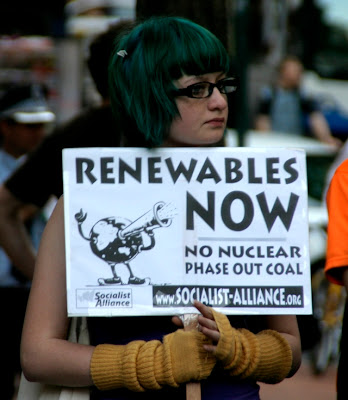green jobs
For jobs and the environment: Why the workers occupied the Vestas wind turbine plant

Below is the text of a speech written by a Vestas worker for delivery at trade union and environmental movement meetings. It gives an excellent insight into the background of the struggle, and its wider political significance. It first appeared at http://savevestas.wordpress.com. See also ``Capitalism vs the environment: Wind turbine workers fight factory closure with sit-in'' for more coverage.
* * *
I’ve come today to speak about a little factory called St. Cross on the Isle of Wight – otherwise known as Vestas; you may have heard about it before …

By Rick Wolff
June 5, 2009 -- The greatest tragedies among many in the collapse and bankruptcy of General Motors (GM) concern what is not happening. There are those solutions to GM's problems not being considered by Obama's administration. There are the solutions not being demanded by the United Auto Workers Union (UAW). There are all the solutions not even being discussed by most left commentators on the disaster. Finally there are crucial aspects of GM's demise not getting the attention they deserve.
What’s wrong with a 30-hour work week?

By Don Fitz
May 30, 2009 -- With millions of jobs lost during the first part of 2009, who is calling for a shorter work week to spread the work around? Not the Republicans. Not even the Democrats. But why is there nary a peep from unions?
In the US, the vehicle industry sets the pace for organised labour. The only discussion at the top levels of the United Auto Workers Union (UAW) is how quickly the gains won during the last 50 years can be given back. Does the UAW have no memory of the 1930s and 1940s when a shorter work week was at centre of organising demands?
The gross domestic product is plummeting at the same time that jobs are disappearing. Why should there be any connection between the two? If society produces 10% less, why don’t we all just work 10% less? Didn’t things work like that for hundreds of thousands of years of human existence? When people figured out easier ways to get what they needed, they spent less time doing it.
La revolucion energetica: Cuba's energy revolution

By Laurie Guevara-Stone, photos by Mario Alberto Arrastia Avila
April 2, 2009 -- A new revolution is sweeping the island of Cuba, which is making massive progress on energy efficiency and renewable generation. Indeed, such is the success of the two-year old program on this small island of 11 million people, that many other countries could learn from its efforts to be energy independent and curb climate change.
The best way to protect auto industry jobs is to stop making cars

By Don Fitz and Tim Kaminski
Production-side environmentalism -- Can we produce less and consume more?

By Don Fitz
Corporate "environmentalism" is consumer-side environmentalism. "Make your dollars work for the Earth." "Buy green!" "Purchase this green gewgaw instead of that ungreen gadget." "Feel guilty about driving your car."Consumer-side environmentalism is loath to discuss production. Consumer-side environmentalism does not challenge the manufacture of cars. Rather, it assumes that producing more and more cars is a sacred right never to be questioned.
Production-side environmentalism places blame on the criminal rather than the victim. It looks at the profits oil companies reap from urban sprawl rather than demeaning people who have no way to get to work other than driving a car. Production-side environmentalism looks at an agro-food industry which profits from transporting highly processed, over-packaged, nutrient-depleted junk thousands of miles rather than the parent giving in to a child bombarded with Saturday morning pop-tart-porn TV.
Production and consumption: A broken connection
Spend the trillions on climate!

Sydney, October 2, 2008.
Climate change -- the case for public ownership
